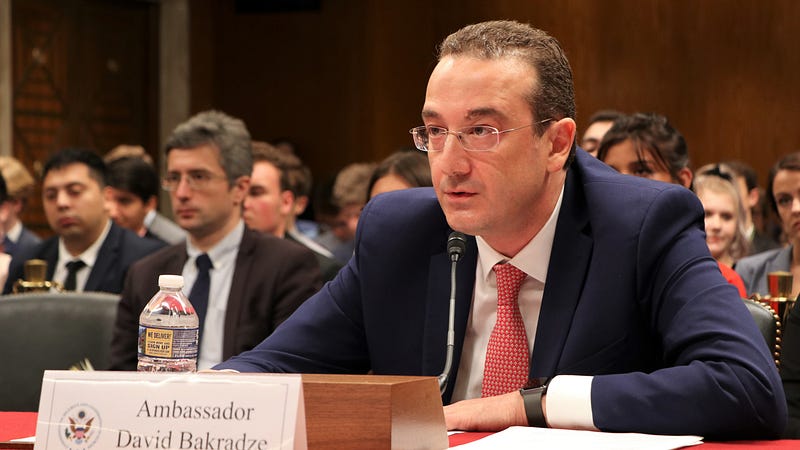U.S. Congress Holds a Hearing on 10 Years of Georgia’s Occupation by the Russian Federation






August 2018 marks the ten-year anniversary of Russia’s invasion of the territories of Abkhazia and South Ossetia in Georgia. More than a decade later, one-fifth of Georgian territory remains under Russian occupation.
On June 17, the Commission on Security and Cooperation (CSCE) in Europe known as the U.S. Helsinki Commission held a hearing on Russia’s occupation of Georgia and the erosion of the international order. The commission discussed violations of the Organization for Security and Cooperation in Europe (OSCE) principles and commitments by the Russian Federation, and the severe human rights situation in illegally occupied regions of Georgia Abkhazia and South Ossetia.






Ambassador of Georgia to the United States, H.E. David Bakradze, Mr. Damon Wilson of the Atlantic Council, and Mr. Luke Coffey of the Heritage Foundation spoke before Congress regarding the humanitarian and human rights situation in the occupied regions of Georgia, the implication of Russian aggression for U.S. interests, and wider European and North-Atlantic security. Additionally, the witnesses discussed potential actions and strategies that the United States and its allies can take to restore the territorial integrity of Georgia and respect for its sovereignty.
Promoting human rights, democracy, economic, environmental, and military cooperation in the 57-nation OSCE region, the Helsinki Commission stated that Moscow’s invasion of Georgia demonstrated the Kremlin’s willingness to use military force to unilaterally re-draw European borders and challenge the right of its neighbors to choose their own futures. According to the commission, “the war in Georgia set the stage for Vladimir Putin’s subsequent war in Ukraine, including the illegal occupation of Crimea and the Donbass and the attempted annexation of Crimea.”






The human costs of Russian occupation in Georgia have been tragic. Tens of thousands of Georgians remain internally displaced and face arbitrary detention, mistreatment, and even death if they attempt to visit their property and communities across the Russian-imposed internal administrative boundary. “Russia enforces its occupation through a large military deployment and, in concert, with de facto Ossetian and Abkhaz authorities, prevents NGOs and monitoring missions from entering the occupied regions. Despite the displacement of tens of thousands of ethnic Georgians from the 2008 war, many thousands continue to reside in the territories where they face discriminatory policies aimed at marginalizing Georgian culture, including strict restrictions on Georgian language instruction in schools. Russian authorities continue to engage in what has been termed ‘creeping annexation’ through the incremental advancement of the razor wire administrative line deeper into Georgian territory,” said the Helsinki Commission.
Ambassador Bakradze shared the information on the situation in the occupied regions of Georgia, discussed Russia’s ongoing illegal actions and deprivation of human rights in those territories, and elaborated on Georgia’s efforts to peacefully resolve the conflicts in Georgia’s occupied regions. Ambassador Bakradze thanked the United States Congress, government, and administration for the bipartisan support of Georgia’s NATO integration process and opposition to Russian occupation of Georgian territories.






“Georgia enjoys widespread bipartisan support across the US government, Congress, and administration. The Georgia-US bilateral relationship has never been stronger and continues to strengthen under the current administration, which has repeatedly stated its opposition to Russian occupation of Georgian territories as well as Georgia’s NATO integration process. The US Congress has been always vocal on these very important Georgia matters. We believe that this durable and long-term cooperation between the US and Georgia have transformed into a very solid strategic partnership that will gradually form a very strong alliance,” noted Ambassador Bakradze. He continued to explain, “it is time that this political support is further reinvigorated in practical steps in order to ensure the implementation of the Ceasefire Agreement and a comprehensive peaceful settlement in my country. We believe through consistency and hard work we can lay the groundwork for lasting peace and security in Georgia. In that regard, I would like to emphasize the necessity of a peaceful conflict resolution to be placed high in the international discussion as well as in the US dialogue with Russia. Strong leadership of the United States is essential to reach progress in the resolution of the Russia-Georgia conflict.”






All witnesses agreed that Georgia should be admitted to NATO as it has met or exceeded the benchmarks of a prospective member state. They recalled the alliance’s failure at its 2008 Bucharest Summit to extend membership invitations to Georgia and Ukraine that effectively signaled to Moscow NATO’s wavering commitment to the defense of these countries. In their opening statements, US Helsinki Commissioners affirmed the bipartisan, bicameral commitment in US Congress to Georgia’s territorial integrity and NATO aspiration. Commission Chairman Roger Wicker and Ranking Member Ben Cardin noted their joint introduction of Senate Resolution 106 that affirms the territorial integrity of Georgia and Senate Resolution 557, which expresses the strategic importance of NATO to US security.
Senator Roger Wicker, the Chairman of the US Helsinki Commission, closed the hearing with remarks on the democratic progress of Georgia and said, “Mr. Ambassador I want to congratulate Georgia on the progress that you are making on the rule of law and independent judiciary and all of the things that we look for in countries that would like to join the Western alliance. We are not going to forget you. We are going to continue speaking up about this, we are going to be guided by the testimonies of the three outstanding witnesses today [referring to Bakradze, Wilson and Coffey]”
